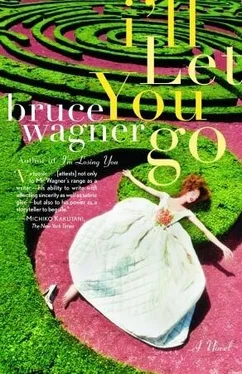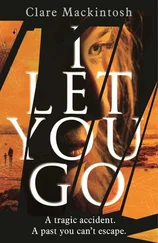They went to the kitchen to look for food and, Amazing Amy aside, did have pizza for breakfast. They cackled and whispered and Tina shushed them from the bedroom. The little girl came in the front door with her doll and the mangy dog. The latter, casting a rheumy eye on garbage and grotty dishes, turned around and sauntered out to the deck.
For some reason, watching him go struck the girls’ funny bones, and they laughed some more, then Kristl broke a glass; they winced and grew still. Her mother sprang from the bedroom. Amaryllis stared — her bush was the center of a giant spiderweb tattoo that spread across thighs and stretch-marked stomach. Tina fastened on to Kristl’s arm and shoved her into the bedroom. She started screaming and Kristl screamed back and Amaryllis heard Mike tell them both to shut the fuck up. The doll said it wanted breakfast.
Amaryllis saw money and a pack of cigarettes on the floor next to a beanbag chair. She grabbed them, crept through the front door and bolted down the long gravel drive.
Shutting its sticky eyes in sleep, the old dog listened to her steps recede.
It has been written that after many a summer dies the swan, but plenty happens in the seasons preceding such a lyrical demise. To wit: the heavy-bodied bird must shed its feathers before finding a mate. That is what renders it flightless.
During most of his season, Will’m nested. Though he never ventured to Northern California, he did take the other half of his friend Fitz’s advice, trimming the wild oak tree of a beard close enough to skin so that it looked inadvertently modern (or nearly so). His accent too was shorn, the notes still melodious yet steeped in less juice; anachronisms came fewer and further between, while contemporary phrases and intonations grew like sprigs from pavement cracks. There was no explaining that. Our fugitive ruefully discarded his telltale tweeds and took to wearing a Smart & Final Iris windbreaker. He did not want for money, thanks to the deathbed bequest of the late, lamented Geo. Fitzsimmons; in the envelope that graced the blouse of the suicide lay $6,000, which Will’m did nothing to flaunt.
To what do we owe this transformation? That he was mindful of police and the continuous danger of his circumstances certainly did not explain all, for a larger part of him remained quixotic and incognizant of the threats of the world. On the streets, and with his toilet, he proved competent as always: only twice did he find himself significantly interviewed, each time by armed squadrons on horseback. Polite and sober-eyed throughout, still “in character”—but with the lambent fire of an actor more than midway through a very long run — Will’m refrained from the extemporaneous outbursts that were already so much a part of his past. In both instances, though he couldn’t produce sufficient I.D., he remained apologetic and unmolested, Santa Monica on the whole being indigent-friendly; the tanned, hairy-armed cops cantered off in search of nubile beachgoers committing misdemeanors.
How, then, to explain the mellowing?
He spent hours atop a Macy’s bath towel, burning his skin at the shore. The waves lapped relentlessly as is their wont; sunbathers lazed and sortied in pointillist ballet; dusk ushered in the nebulae. He imagined himself illustrated, a hero on a dead world that was tentatively beginning to flower again — saw himself standing tall under empyrean tempera of cloud-scudded sky, replete with William Morris’s beloved Arthurian garb, a gleaming, high-crested morion stuffed onto thickened head, with smoky visor and ventail, fat thighs squeezed into cuisses, wearing épaulières of rubies plucked from Saturn’s rings, sword and escutcheon raised against bottomless heavens filled with vessels of improbable size disgorging a-hundred-thousand-score armies of desperate, adventuresome men: celestial warriors! Will’m lay on the sand with his recumbent DNA and bore minuscule, magisterial witness to the wonder-book of yawping cosmological eye. (Science fiction pocket-book covers had forever seared the memory of a boy called Marcus Weiner, but the cryptonesic Will’m knew not whence the images came.) The pounding of surf stupefied him with reverence — any damn fool knew there had to be life elsewhere. Soon starships would hover like floating Escherian cities, ivied and fountain-filled, populated by toga’d handmaidens. “Fitz?” Will’m used to say. “We are temporal and temporary beings, nebulous childr’n on a wildly moving place!”
Like most fellow nomads, our friend enjoyed roaming the 3rd Street Promenade and varied fringes of this fair Bay City, and sitting on benches in front of the bookstores. The presence of so many volumes preening for passersby from behind the glass was heartening. One day, mused Will’m, he must use a portion of Fitz’s legacy to take a cab to that downtown place where the News from Nowhere journal of his wandering years was stored; a taxi would be more prudent than profligate — the detective and his minions were likely to entrap him if he went on foot.
On emerging from his reverie, he found that a woman of tremendous bulk had materialized beside him. She panted and perspired, her tender dewlap trembling as she turned to address him with doleful eyes.
He could do nothing but place an arm about her shoulders — something she seemed to sorely need, for her shaking instantly ceased.
“Are you all right?” he asked.
She made a guttural sound, then sneezed. He looked at her quizzically, and she sneezed again. Coughed. Laughed. Trembled and coughed again. He laughed himself, then said: “Christ! Can you speak?”
“Ih c’n! Ih c’n! C’n spake!”
But not well enough to intelligibly give her name: Jane Scull.
“Are you — are you hungry ?”
“Yihss! Am — am unh-gree!”
She spoke in great grunting edicts, like a cannonball angel. Dirty white hearing aids were shoved in both ears.
“Good!” he shouted. “Let’s get you a Johnny Rocket’s!”
Will’m stood and walked a pace, then turned to see what she was up to. She stayed rooted, staring back like a frightened child — it panged him, for her helplessness evoked his orphan-daughter Amaryllis. Seizing a clammy hand, he steered them past storefronts. Three cheeseburgers and a quantity of milk shakes were ordered (strawberry, vanilla, chocolate), for which the cashier made him pay in advance. Then all the waiters and waitresses seemed to go mad, abandoning their posts while dancing and gesticulating to the music of the little silver jukes; he’d been to this café before, but had never seen such mayhem. Of an instant, their choreographies ceased and everything returned to normal. A few patrons laughed among themselves, amused by the gaping transient couple.
That he called her Janey (a thing that made the startled girl feel as if he could read minds), was a happy coincidence to his own privately parallel world — a slew of personae now alternately burning bright and fading too within the frayed fabric of a serpentine, superbly demented history. For while Will’m had begun to molt (as established), strange plumage persisted: wife Jane Burden, daughters Jenny and Mary; mentor Ruskin; boon companions Burne-Jones and Rossetti — the latter his best friend, who, so legend had it, betrayed Mr. Morris to become Janey’s paramour …
At dusk, they made their way to the boarded-up hotel where he’d been squatting. Jane Scull’s eyes widened with delight on seeing the room, as if it were Bexleyheath itself. It was clean and presentable enough, with a large scrap of wax paper tacked to the wall, upon which Will’m had stenciled flowers — trademark latticework of poppy, honeysuckle and fritillaria. The work left off abruptly, its maker having lost the thread.
Читать дальше












